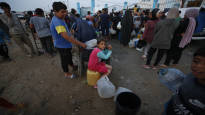On Friday, the International Court of Justice will rule on South Africa’s request to order Israel to suspend its military operations in the Gaza Strip.
Vilma Romsi,
Katriina Töyrylä
The International Court of Justice (ICJ) today gives its ruling on South Africa’s request to order Israel to stop its military operations in the Gaza Strip.
South Africa asked the ICJ last week to order Israel, as an emergency measure, to stop its attack on Rafah, in the southern tip of Gaza, and to withdraw its forces from the Gaza Strip.
The request is part of a wider lawsuit filed by South Africa, in which the ICJ is examining whether Israel is guilty of mass destruction in Gaza.
In January, the ICJ issued an interim ruling ordering Israel to do everything possible to prevent genocide and improve the humanitarian situation in Gaza.
The ICJ’s rulings are legally binding, but it does not have the authority to ensure that states comply with the rulings. Among other things, the ICJ has ordered Russia to end its war of aggression in Ukraine.
Israel has ignored the ICJ order. It has rejected accusations of mass destruction and insisted that its military actions in Gaza are self-defense. Israel set a goal of destroying the extremist organization Hamas after Hamas attacked Israel and killed around 1,200 people on October 7.
The humanitarian crisis worsens in Rafah
At the beginning of May, Israel launched a ground offensive in Rafah, which was the last area in the Gaza Strip to escape ground attack. Up to 1.5 million Gazans had sought refuge in Rafah. Because of this, the UN, aid organizations, the United States and EU countries have warned that the attack on Rafah would cause a humanitarian disaster and demanded that Israel withdraw its attack.
The Israeli military claims to be conducting a limited precision operation in Rafah, but in practice this is considered impossible due to the dense population of the area. Israel has ordered civilians to move to so-called humanitarian areas, and until now more than 800,000 people has fled Rafah.
Due to the fighting, almost all food distribution in Rafah has stopped, the World Food Program (WFP) and the Palestinian Refugee Agency (UNRWA) say.
According to the Hamas-run Gaza Ministry of Health, more than 35,000 people have died in Israel’s military operations. Although there is no comprehensive independent information on the number of dead while the war is going on, for example the UN and several experts consider the numbers relatively reliable.
Source: Reuters
